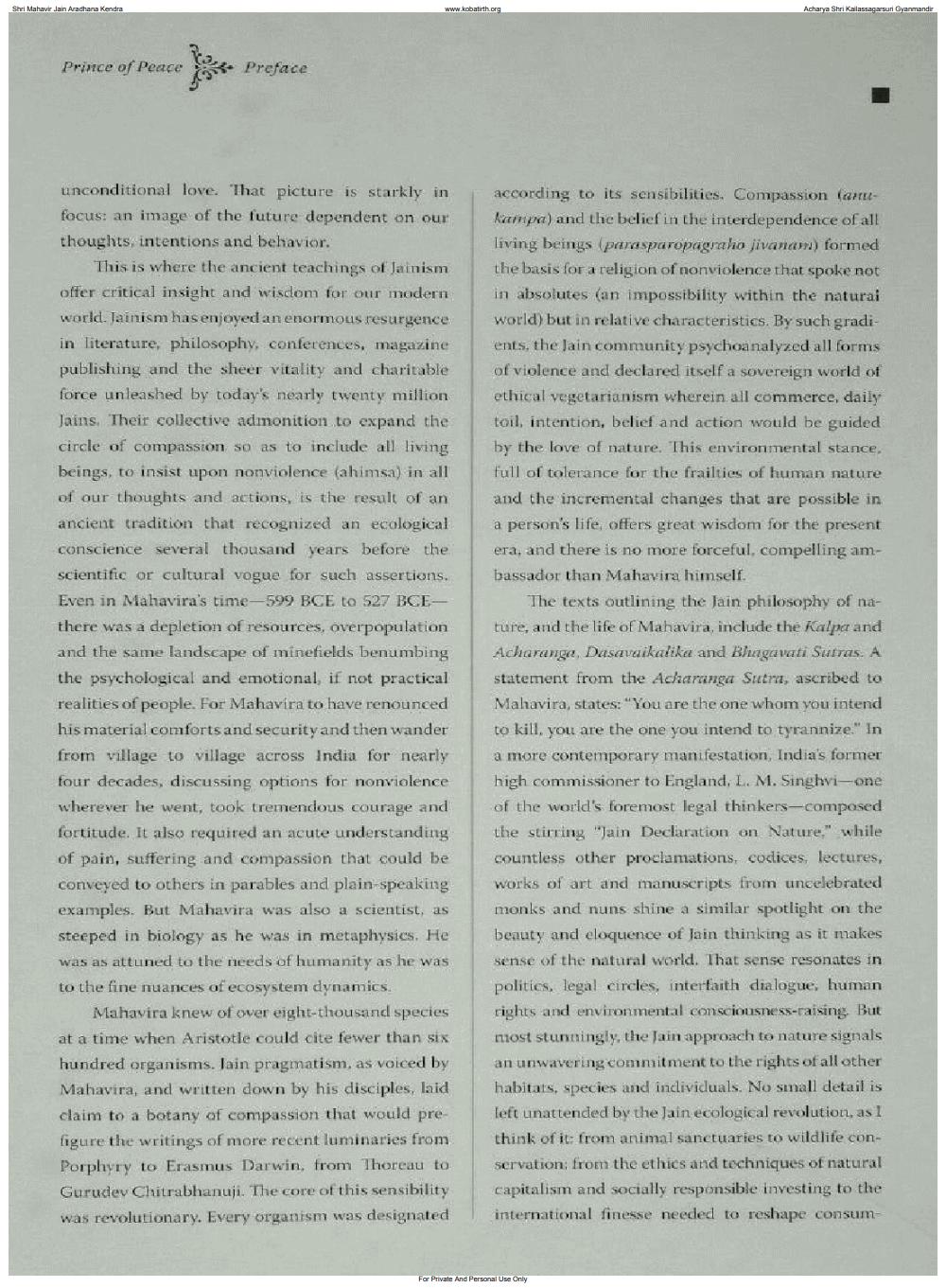________________
Shri Mahavir Jain Aradhana Kendra
www.kabatirth.org
Acharya Shri Kailassagarsun Gyanmandir
Prince of Peace
Preface
unconditional love. "That picture is starkly in focus: an image of the future dependent on our thoughts, intentions and behavior.
This is where the ancient teachings of Jainism offer critical insight and wisdom for our modern world. Jainism has enjoyed an enormous resurgence in literature, philosophy, conferences, magazine publishing and the sheer vitality and charitable force unleashed by today's nearly twenty million Jains. Their collective adınonition to expand the circle of compassion so as to include all living beings, to insist upon nonviolence (ahimsa) in all of our thoughts and actions, is the result of an ancient tradition that recognized an ecological conscience several thousand vears before the scientific or cultural vogue for such assertions. Even in Mahavira's time--599 BCE to 527 BCEthere was a depletion of resources, overpopulation and the same landscape of minefields benumbing the psychological and emotional, if not practical realities of people. For Mahavira to have renounced his material comforts and security and then wander from village to village across India for nearly four decades, discussing options for nonviolence wherever he went, took tremendous courage and fortitude. It also required an acute understanding of pain, suffering and compassion that could be conveyed to others in parables and plain-speaking examples. But Mahavira was also a scientist, as steeped in biology as he was in metaphysics. He was as attuned to the needs of humanity as he was to the fine nuances of ecosystem dynamics.
Mahavira knew of over eight-thousand species at a time when Aristotle could cite fewer than six hundred organisms. Jain pragmatism, as voiced by Mahavira, and written down by his disciples, laid claim to a botany of compassion that would prefigure the writings of more recent luminaries from Porphyry to Erasmus Darwin, from Thoreau to Gurudev Chitrabhanuji. The core of this sensibility was revolutionary. Every organism was designated
according to its sensibilities. Compassion anneKampa) and the belief in the interdependence of all living beings (parasparopagraho jivana) formed the basis for a religion of nonviolence that spoke not in absolutes (an impossibility within the naturai worla) but in relative characteristics. By such gradi ents, the Jain community psychoanalyzed all forms of violence and declared itself a sovereign world of ethical vegetarianism wherein all commerce, daily toil, intention, belief and action would be guided by the love of nature. This environmental stance, full of tolerance for the frailties of human nature and the incremental changes that are possible in a person's life, offers great wisdom for the present era, and there is no more forceful, compelling ambassador than Mahavira himself.
The texts outlining the Jain philosophy of nature, and the life of Mahavira, include the Kalpa and Acharanga, Dasavaikalika and Blugavati Sutras. A statement from the Acharanga Suth, ascribed to Mahavira, states: "You are the one whom you intend to kill, you are the one you intend to tyrannize." In a more contemporary manifestation, India's former high commissioner to England. L. M. Singhi-one of the world's foremost legal thinkers-composed the stirring "Jain Declaration on Nature." while countless other proclamations, codices, lectures, works of art and manuscripts from uncelebrated monks and nuns shine a similar spotlight on the beauty and eloquence of lain thinking as it makes sense of the natural world. That sense resonates in politics, legal circles, interfaith dialogue, human rights and environmental consciousness-raising. But most stunningly, the Jain approach to nature signals an unwavering commitment to the rights of all other habitats, species and individuals. No small detail is left unattended by the Jain ecological revolution, as I think of it from animal sanctuaries to wildlife conservation from the ethics and techniques of natural capitalism and socially responsible Investing to the international finesse needed to reshape consum
For Private And Personal Use Only




